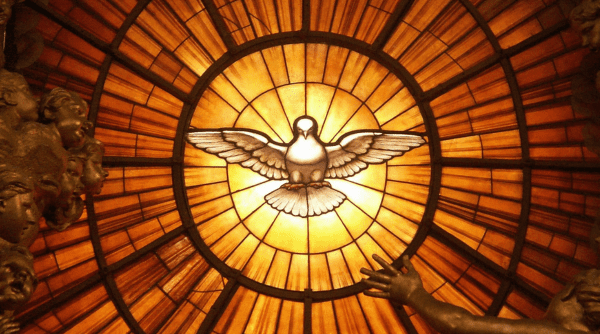Tradition, the liturgy of the Church, and Sacred Scripture itself have given the Holy Spirit many names. He is called the Paraclete Spirit, Creator Spirit, Spirit of Christ, Comforting Spirit, Spirit of Truth, Virtue of the Most High, Advocate, Finger of God, Guest of the Soul, Seal, Union, Link, Bond, Kiss, Living Fountain, Fire, Spiritual Anointing, Most Beatific Light, Father of the Poor, Giver of Gifts, Light of Hearts, and so on.
Let us briefly examine the foundations of these names appropriate to the Holy Spirit.
1. Paraclete Spirit. Jesus Christ Himself uses this expression alluding to the Holy Spirit (see John 14:16, 26; 15:26; 16:7). Some translate it by the word Teacher, because Christ Himself says a little later that “he will teach you all things” (John 14:26). Others translate by Comforter, because He will prevent the apostles from feeling orphaned by the gentleness of His consolation (see John 14:18). Others translate the word Paraclete by Advocate, who will plead for us, in the words of St. Paul, “with sighs too deep for words” (Rom. 8:26).
2. Creator Spirit. “The Holy Spirit,” says St. Thomas, “is the principle of creation.” The reason is that God creates things out of love, and love in God is the Holy Spirit. That is why the psalm says: “When thou sendest forth thy Spirit, they are created” (Ps. 103:30).
3. Spirit of Christ. The Holy Spirit completely filled the most holy soul of Christ (see Luke 4:1). In the synagogue of Nazareth, Christ applied to Himself the following text from Isaiah: “The Spirit of the Lord God is upon me” (Isa. 61:1; see Luke 4:18). St. Paul says that “any one who does not have the Spirit of Christ does not belong to him” (Rom. 8:9); but “if the Spirit of him who raised Jesus from the dead dwells in you, he who raised Christ Jesus from the dead will give life to your mortal bodies also through his Spirit who dwells in you” (Rom. 8:11).
4. Spirit of Truth. This is an expression Christ Himself applied to the Holy Spirit: “The Spirit of truth, whom the world cannot receive, because it neither sees him nor knows him” (John 14:17). According to St. Cyril and St. Augustine, it means the true Spirit of God, and is opposed to the spirit of the world, to deceitful and fallacious wisdom. That is why the Savior adds “which the world cannot receive,” because “the unspiritual man does not receive the gifts of the Spirit of God, for they are folly to him, and he is not able to understand them because they are spiritually discerned” (1 Cor. 2:14).
5. Virtue of the Most High. This is the expression used by the angel at the Annunciation when He explains to Mary how the mystery of the Incarnation will be accomplished: “The Holy Spirit will come upon you, and the power of the Most High will overshadow you” (Luke 1:35). Other Gospel passages also allude to the “power from on high” (see Luke 24:49).
6. Finger of God. In the hymn Veni, Creator Spiritus, the Church designates the Holy Spirit with this mysterious expression: “Finger of the right hand of the Father,” Digitus paternae dexterae. It is a metaphor very rich in content and very fruitful in applications. Because in the fingers of the hand, especially the right hand, is all our constructive and creative power. That is why Scripture places the power of God in His hands: the tablets of the Old Law were written by the “finger of God” (Deut. 9:10); the heavens are “the work of thy fingers” (Ps. 8:3); the magicians of Pharaoh had to recognize that in the wonders of Moses there was “the finger of God” (Exod. 8:15), and Christ cast out demons “by the finger of God” (Luke 11:20). This expression, applied to the Holy Spirit, is therefore very appropriate to signify that through Him all the wonders of God are accomplished, especially in the order of grace and sanctification.
7. Guest of the Soul. In the sequence of Pentecost, the Holy Spirit is called “sweet guest of the soul”: dulcis hospes animae. The indwelling of God in the soul of the just corresponds equally to the three Divine Persons of the Blessed Trinity, since it is an operation ad extra (see John 14:23; 1 Cor 3:16–17); but since it is a work of love, and these are attributed in a special way to the Holy Spirit, He is considered in a very special way as the most sweet guest of our souls (see 1 Cor 6:19).
8. Seal. St. Paul says that we have been “sealed with the promised Holy Spirit” (Eph. 1:13), and also that “it is God who establishes us with you in Christ, and has commissioned us; he has put his seal upon us and given us his Spirit in our hearts as a guarantee” (2 Cor. 1:21–22).
9. Union, Nexus, Bond, Kiss. These are names that express the inseparable and very close union between the Father and the Son by virtue of the Holy Spirit, who proceeds from both by a common spiration of love.
10. Living Fountain, Fire, Charity, Spiritual Anointing. Expressions of the hymn Veni, Creator, which fit very well with the character and personality of the Holy Spirit.
11. Most Blessed Light, Father of the Poor, Giver of Gifts, Light of Hearts. All these expressions are applied by the Church to the Holy Spirit in the magnificent sequence of Pentecost, Veni, Sancte Spiritus.
These are the principal names that Sacred Scripture, Tradition, and the liturgy of the Church appropriate to the Holy Spirit because of the great affinity or similarity that exists between them and the characteristics proper to the third Person of the Blessed Trinity. All of them, well meditated, contain great practical teachings to intensify in our souls the love and veneration of the sanctifying Spirit, to whose perfect docility and obedience is linked the progressive and ascending march toward the highest sanctity.
+
This article on The Appropriate Names of the Holy Spirit is adapted from the book The Great Unknown by Antonio Royo Marin which is available from Sophia Institute Press.
Art for this post on a reflection from “The Great Unknown” by Antonio Royo Marin: cover used with permission; Photo by Gian Lorenzo Bernini, Dove of the Holy Spirit (alabaster stained glass, Chair of Saint Peter, Saint Peter’s Basilica, Vatican City), ca. 1660





